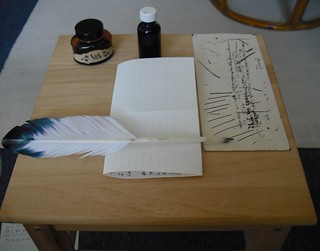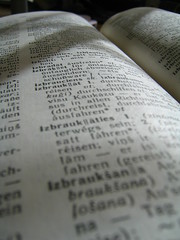I’m probably not the only one who for some strange reason envisioned himself or herself the author of the Next Great American Novel. Literary fiction is the only “real” type of writing, right?
(Um, no! Duh! Somehow, I still fall into this trap sometimes!)
So, sometimes . . . as “me active compensatory feature” (thank you, Ringo), I’d try maybe just a little too hard to sound like a “real” writer. You know the symptoms, right?
Sounding “writerly”
 I absolutely love how author/former literary agent Nathan Bransford defined the difference between writing and being writerly (emphasis mine):
I absolutely love how author/former literary agent Nathan Bransford defined the difference between writing and being writerly (emphasis mine):
Writers describe. They illuminate and clarify. When you’re writing you’re painting the proverbial picture in the proverbial reader’s head.
When you’re being writerly, your writing is making things less clear with clever word play.
It isn’t just contrived sentence structure or imagery that hurts you. Diction—word choice—can be used to look like a “good” writer. Instead, you just end up sounding writerly. Or as agent Ann Collette tweeted in her Today’s Twelve roundup of queries:
#3: Horror. Saleable premise but overblown prose. New authors should try to avoid “Look Ma, I’m writing!” syndrome. Pass.
— Ann Collette (@Ann_Collette) June 21, 2012
And what does that mean? Ann elaborated a little:
@JordanMcCollum For some, it’s a stage. For others? A perdurable affliction.
— Ann Collette (@Ann_Collette) June 21, 2012
Get it? Get it?
The “right” word
Just knowing the “right” word doesn’t necessary make it the right word (tautology FTW!). When we look up an obscure term for our research in our setting, it might be right in the sense that it describes it accurately—but even if it’s right in that sense, if your audience doesn’t know the term, it won’t help them visualize it. Then is it “right”?
In a day of instant information, readers really do put down books to look stuff up. I even documented a time I did that here on the blog: a novel I was reading named an obscure medical device, as if that would be enough for us to picture it being used as a weapon. It was not, I opined, the right word because I couldn’t visualize the pivotal weapon throughout the scene and, frustrated, put the book down to hop on the Internet. (And being me, it was some time before I got back to it, most likely.)
 As a writer, I went through this with the word “inveigle” in one manuscript (okay, since we’re confessing: I’ve been through it a lot in pretty much every manuscript, but this is one of those stories). I found it in a thesaurus and the definition looked right.
As a writer, I went through this with the word “inveigle” in one manuscript (okay, since we’re confessing: I’ve been through it a lot in pretty much every manuscript, but this is one of those stories). I found it in a thesaurus and the definition looked right.
I decided to ignore the fact that pretty much everyone I had read it—intelligent, college-educated people who really like me—tripped over that word and pointed it out. It was Capital-R-Right and nobody was going to convince me otherwise. After all, isn’t reading how we grow our vocabularies? Didn’t I see, like, one blog comment once where someone said they liked a book to teach them some new words??
If the logic sounds tenuous, it was. Finally, after yet another friend mentioned that word, I went on a hunt for that word in the wild. This is something you should always do with new words. (Google, how I love you.)
And what did I find? It seemed to have a connotation I definitely didn’t want there. It hurt, but I cut that word—because it wasn’t as right as I thought. And since then, I’ve cut a few more words that might send readers running for their dictionaries—because I don’t want to pull them out of the story, but mostly because they weren’t in the characters’ voices anyway.
Not being writerly
Fortunately, Nathan Bransford also offers guidelines on avoiding “writerliness.”
Whenever you’re unsure about including a metaphor or an evocative description, ask yourself: Does this make the scene clearer? Or am I including it because it’s clever/original/was fun to write?
Different writers have different tastes, but count me down in camp clarity.
Me too. That isn’t to say your writing, even in genre fiction, shouldn’t be clever, original or fun to write. Of course it should! But again, if it becomes harder for the reader to understand, take a hard look at the passage.
The right word, phrase, or image:
- is clear!
- has the right definition (denotation)—real editors absolutely DO use dictionaries, even when they don’t really doubt the definition or usage.
- is as vivid, powerful and succinct as the context needs
- carries the right connotation
- is right for the character’s voice
- is right for the genre/book: you absolutely can have “art prose” in “genre fiction,” but it must be consistent with the tone, subject, character, etc.—and it needs to be consistent through that book (or POV)
- is right for the general reader, carrying him or her along with the story instead of pulling him/her out
You can get away with breaking maaaybe one of those axioms with a word or phrase, and even then, you shouldn’t do that too frequently—so choose carefully. And remember that every time your reader has to set your book down to look up an obscure term or reread a sentence to try to picture what you’re writing, there’s a better and better chance that he won’t continue reading, frustrated that you keep talking over his head.
Make your reader forget that he’s staring at black marks on a page and get him visualizing your story instead!
What do you think? What’s “writerly” to you?
Photo credits: quill—Charles Stanford; dictionary—Harry

